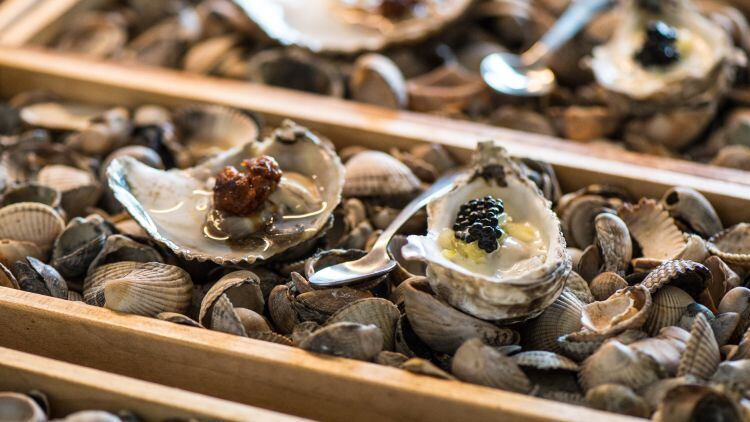The Seasalter venue has already scooped a host of accolades in 2022. Aside from securing its Michelin-starred status last Wednesday (16 February), the venue was crowned the UK’s sixth top gastropub in January in the Estrella Damm 50 Top Gastropubs list.
“For the past decade, I’ve been working with the idea of the food reflecting the landscape around the pub”, said the punk-musician-turned-head chef. “It's such a weird, beautiful place. It’s by the sea, on a salt marsh in the middle of nowhere, with no village around it. I just cook what is grown, wild and seasonal around me.”
Harris’s style echoes the French term ‘terroir’, meaning he uses the complete natural environment around him. He said the stretches of coastline, saltmarshes and flat lands made Kent a “great natural larder”.
“Being by an estuary has brought in shellfish that, in turn, attracted birds,” Harris added. That the county was sunnier than the rest of the country made it the perfect climate for soft-grown fruit, with meat coming from surrounding farms, he said.
For instance, ingredients of the menu’s mushroom and celeriac tart were sourced locally. Harris explained there is a place near to the Sportsman that grows mushrooms, which have been paired with a celeriac foam which is like a "Hollandaise of celeriac” for the dish.
Gorgeous flavours
Everybody loved the tart, according to Harris, who put this down to the old-school, melt-in-the-mouth shortcrust pastry.
On the inspiration for his pot-roast cabbage dish, Harris said: “We were looking for a new way of cooking vegetables. I very slowly pot-roasted a red cabbage and it came out all soft and lovely, with a really gorgeous flavour. It was mild, sweet and lovely, so we serve that with a bit of mustard and apple dressing.
“We get so many customers saying ‘oh, my God, I didn't think red cabbage could be so good’.”
For puddings, the Sportsman serves Bramley apple soufflé with vanilla ice cream and salted caramel, pear and almond tart, and a hot chocolate mousse.
When making a soufflé, Harris uses Bramley apples for a sharp flavour that differs from the softer taste of baked apple. The fruits weren't cooked for too long so when bit into it there was a "real sharp zing". Then, the ice cream gives it a luxurious element because, "what’s better than salted caramel?” proclaimed the chef.
What’s more, the menu’s cured trout dish includes apple juice, and granita sorrel from the garden. The seaweed is collected from the beach, dried, then turned into a powder to dress the fish. It’s served with a raw cream dressing to give an “extraordinary taste”.
“I was the first chef to make my own butter," said Harris. "Before I started doing it in 2004, there wasn't anywhere in the world that did it. Everyone’s using it now, and it was a bit against the grain when I started using it, but that’s cool."
Rock-salt & bread-roll
While use of butter had become mainstream, the idea of local fish cooked in butter you’ve made yourself from the dairy up the road, the seaweed from the beach, with salt from seawater, was still “quite a unique thing”.
Inspiration for the seaweed was sparked by a trip to Japan, where the ingredient had been part of the food culture for a long time. On returning home, Harris realised there was no difference between the seaweed in Kent and Japan so he started using it in his dishes.
While the chef was flattered by the fact his dishes, including his handmade butter, were copied across the country, he suggested chefs should work with ideas a bit rather than nicking them completely.
“It’s like if one band covers another band’s song and they do it exactly the same, what’s the point? You may as well bring something new to it,” he reasoned.
Before turning to cooking, the chef was a punk musician, and played in bands from the age of 15 until he was 21. The creative and collaborative elements of being in a band acted as a reference point when he was being creative with food.
He explained: “The way an idea comes from your brain and ends up on a plate is the same as when writing music. One minute the song doesn’t exist and the next minute it does due to what happens in your brain.
“For me, that’s what life's about. Once you can feed yourself, and you've got a roof over your head, the next stage is to start making things.”
Why change a classic?
Harris goes through periods of ‘creative drought’ before inspiration hits and he can produce a constant flow of ideas for weeks or months at a time. Rather than cooking something from every single idea, he can project flavours into his mind to test them out.
“It sounds funny, but it’s a lot quicker than cooking,” he said. “It’s a bit like meditation. You have an idea in your head and you can almost taste it. You stop and think of the flavour of the ingredient then you put something with it and you can figure out if it will work or not.”
However, curating the dishes was about more than just flavour. Tastes like sweet, sour, bitter or umami were important, as were textures. Then, he said, you have to consider temperature and will also want to stimulate the mouth using chilli or a small amount of mustard.
For Harris, it was important to balance creativity with consistency. “Chefs can be a bit too precious in creating new dishes all the time,” he said.
“People come here because they want a certain thing. If you went to see The Rolling Stones, you don’t want to see their new material, you want to see Brown Sugar and Tumbling Dice – you want the classics.”
Standards must be kept high, he explained, and there can’t be too many changes to dishes but, at the same time, chefs had to make things interesting and keep customers on their toes.
Harris said: “Like with everything, there’s no hard and fast rule. There’s a balance to be struck.”




